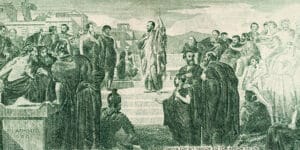Imagine yourself amidst the bustling crowd that day, the air thick with anticipation and the earth beneath your feet trembling with the collective excitement of those gathered. The dusty streets…
“Low in the grave He lay—Jesus my Savior! Waiting the coming day—Jesus my Lord.”[1] To all outward appearance, this is a tragic time. Jesus had been crucified. Once His death…
In Part 1, we saw that God Himself claimed that the Bible we have is His written word to us. We saw some of the things He said about the…
Pastor and author Tim Challies writes, “‘Federal agents don’t learn to spot counterfeit money by studying the counterfeits. They study genuine bills until they master the look of the real…
This article explores the question of whether Christians should support the modern state of Israel in light of recent events, particularly a surprise attack by Hamas resulting in fatalities and hostages. The author acknowledges that supporting Israel does not mean endorsing every action or policy, but rather affirming their belief that the land of Israel has been promised to them by God. The article goes on to provide biblical and practical reasons for supporting Israel, and suggests that Christians have a specific call to support Israel as part of their role as the church.
Is the New Testament just legend? What is the significance of Paul’s statements in 1 Corinthians 15? If Paul has given us material about 35 AD on a trip to…
The creedal material that Paul presents in 1 Corinthians 15 is probably the heart of contemporary discussions concerning the historical Paul. And of course, they have a great bearing on the historical…
Did Paul invent Christianity? As we look at 1 Corinthians 15, Paul has said a couple of important things. He said, “I delivered what I received”-and I like these words-“as…
Introduction Can you trust the Gospels? Some critical New Testament scholars have made outlandish claims that Matthew, Mark, Luke, and John really did not write the Gospels. In this article,…
Is there any eyewitness testimony that the early Christians saw Jesus alive after He was killed by crucifixion, buried in a tomb, and then arose from the dead and appeared…













